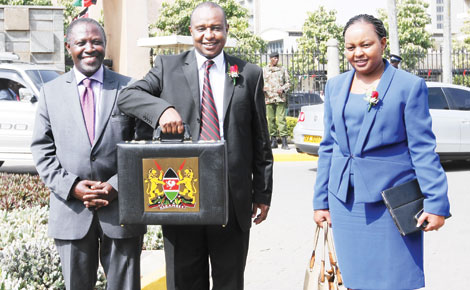×
The Standard e-Paper
Home To Bold Columnists
 |
| Finance Cabinet Secretary Henry Rotich (centre) with Devolution Cabinet Secretary Anne Waiguru and Mbeere South MP Mutava Musyimi after Budget reading last year. [Photo: File/Standard] |
Nairobi, Kenya: Growing public debt has perpetually been a headache to Kenya, especially without significant growth in the economy.
So conspicuous was this burden in the 2008/2009 financial year following the growing budget deficit that had lasted five years, compelling Treasury to allocate a better portion of its revenues to debt servicing.